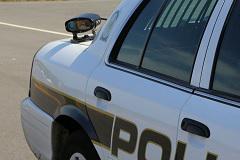License Plate Reader Aids Police but Creates Controversy
Posted by: Timothy Weaver on 08/31/2015 08:38 AM
[
 Comments
]
Comments
]
Vester Lee Flanagan II (a.k.a. Bryce Williams) was spotted by the Virginia State Police with the use of a license plate reader.
 Flanagan was fleeing after shooting to death two Roanoke, Va., broadcast journalists.
Flanagan was fleeing after shooting to death two Roanoke, Va., broadcast journalists.
The use of the license plate reader has brought up a controversy by the American Civil Liberties Union as well as the Electronic Frontier Foundation which feel that the readers gather data and track not just suspects and criminals, but citizens going about their daily business.
Jennifer Lynch, senior staff attorney for the EFF, said: “So while ALPRs may be a useful tool in an extreme scenario like this one, that shouldn't mean the police can indiscriminately keep data for an extended period of time on all other cars in the area."
David Roberts, senior program manager for the International Association of Chiefs of Police (IACP) technology center stated the extent of the usage: "According to the 2013 Law Enforcement Management and Administrative Statistics report by the Bureau of Justice Statistics, U.S. Department of Justice, over three-quarters of local law enforcement agencies serving populations over 100,000 used ALPR technologies. Over half of agencies in jurisdictions of 25,000 – 100,000 reporting using the technology."
However, there is the downside as stated by Lynch: "I think a bigger concern is the threat to free speech posed by this kind of surveillance. When people know they're being watched and the government is collecting information on their lives, they may be less likely to participate fully in society."
Source: SCMagazine
 Flanagan was fleeing after shooting to death two Roanoke, Va., broadcast journalists.
Flanagan was fleeing after shooting to death two Roanoke, Va., broadcast journalists.The use of the license plate reader has brought up a controversy by the American Civil Liberties Union as well as the Electronic Frontier Foundation which feel that the readers gather data and track not just suspects and criminals, but citizens going about their daily business.
Jennifer Lynch, senior staff attorney for the EFF, said: “So while ALPRs may be a useful tool in an extreme scenario like this one, that shouldn't mean the police can indiscriminately keep data for an extended period of time on all other cars in the area."
David Roberts, senior program manager for the International Association of Chiefs of Police (IACP) technology center stated the extent of the usage: "According to the 2013 Law Enforcement Management and Administrative Statistics report by the Bureau of Justice Statistics, U.S. Department of Justice, over three-quarters of local law enforcement agencies serving populations over 100,000 used ALPR technologies. Over half of agencies in jurisdictions of 25,000 – 100,000 reporting using the technology."
However, there is the downside as stated by Lynch: "I think a bigger concern is the threat to free speech posed by this kind of surveillance. When people know they're being watched and the government is collecting information on their lives, they may be less likely to participate fully in society."
Source: SCMagazine
Comments






